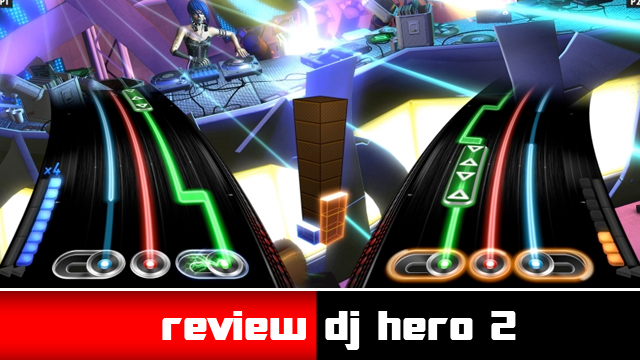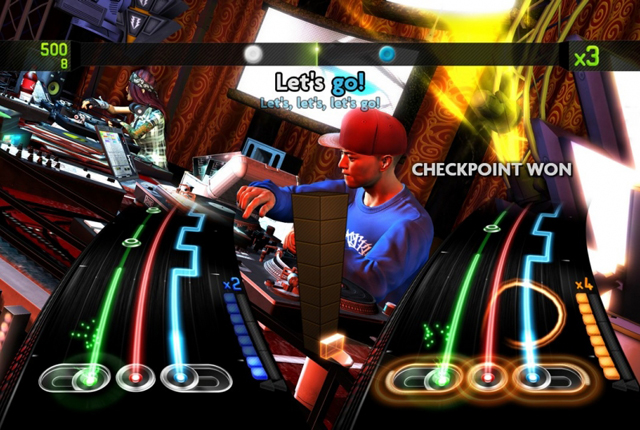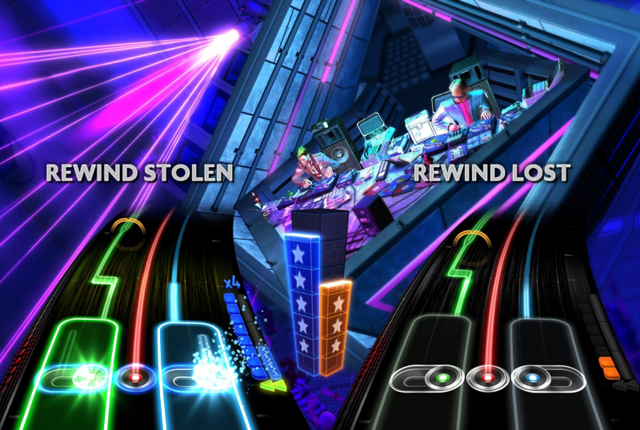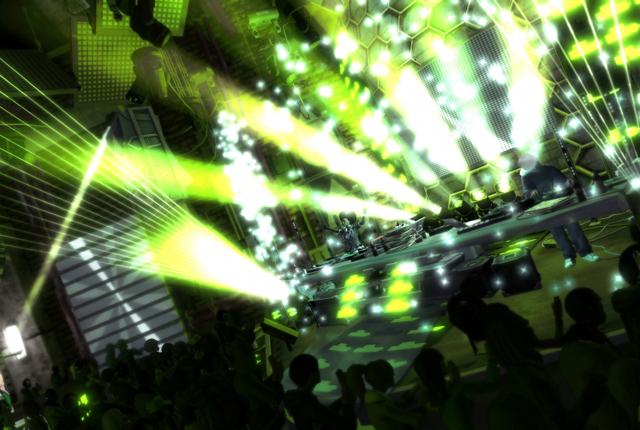
DJ Hero 2 has brought the franchise into it’s own as a top-tier music rhythm game.
Written by: Dalibor Dimovski, Managing Editor
It’s 2AM on a Sunday night. I walk into a thumping club in Ibiza, the mythical party island off of the coast of Spain. The crowd, tired from a weekend of deep bass and laser lights, awaits the rapture of house music.
I’m an up & coming turntablist, lucky enough to score a break and open the night for superstar DJ Q-Bert. As my set begins, the party-goers don’t quite know how to react to my brand of dance and hip-hop mash-ups. But by the end of my set, I’ve whipped them into a frenzy. They cheer at every masterful crossfade and freestyled scratch that I execute, so much that Q-Bert himself challenges me to a mix-off.
After a back & forth of musical battling magic, I win out. Q-Bert can’t help but give me the props I deserve, allowing me to close the night with an epic set of my own.
Five stars. Five perfect, beautiful stars.
That is the feeling I had while playing just the first 30 minutes of DJ Hero 2, the sequel to last year’s niche music rhythm game from Activision. And it only got better after that.
Vitals
Platform: XBox 360, Wii, PS3
Developer/Publisher: FreeStyleGames/Activision
Availability: Now

The first DJ Hero can be seen as the beta to this game — a prequel to the actual, real meat product. It introduced us to the core mechanics needed to let us pretend to be spin jockeys and included interesting musical mash-ups (some of which we didn’t know we would eventually like). Beyond that, it was as bare-bones of an experience as one could get from a music rhythm game: hit the notes at the right time while the music plays and rack up points. Simple.
DJ Hero 2 feels like the experience that was intended all along. One of the changes additions come in the form of new freestyle modes that the game incorporates, creating a vastly improved sense of control, perhaps more than in any music game before it. Specific sections of mixes allow the player to tweak the tune’s audio, through crossfades, scratches, and rewinds, without fear of failing. It comes off as much more satisfying, and feels like there really is an ability to manipulate the song and get the sound that we like.
It’s a beautiful blend of chaos and creativity.
The only drawback is the aging, unchanged turntable controller. Without some necessary tweaks, it still feels like it doesn’t account for accidental “oversteer” and makes mistakes that much more glaring an apparent this time around.

The other major improvement to the game is the multiplayer. The first DJ Hero prided itself on the individual experience. This time, the plethora of multiplayer options opens up a whole new competitive experience. From the ability to play live with a second turntable (and sing along via microphone) to the several creative modes of online play, the experience is much more fulfilling and worthwhile. The streak collecting of Accumulator creates a tense, almost neurotic mood in which notes are “banked” to fill up a gauge. Fumbling a long streak before banking it negates precious seconds of hard work, and allows the opponent to catch up. Checkpoint Battles focus on racking up the highest hit/accuracy percentage during sections of a song, while DJ Battles focus more on a back and forth style of play.
It doesn’t end there, either. Using the Hero Feed, the high scores of friends are displayed live while playing a song, as if to constantly glare and gloat from a precipice until we can best them ourselves and take the spot. It’s a passive way of constantly saying “See my score way up here? Think you can beat it?” The Hero Feed also allows the ability to issue challenges to friends to complete on their own time.
While it’s still not much of the party-starting type of game that Rock Band is, it’s now a better “passive” multiplayer experience than DJ Hero was.
The music selection of DJ Hero 2 is much more “NOW! That’s What I Call Music!” than the first game, but that works to it’s favor. The songs are more recognizable to those who may not be familiar with what the difference is between progressive house and trance, and are easier to swallow for any bystanders in the room. It’s party music, and we can’t help but bob our heads back and forth as we hear the mash-ups and remixes unfold. Some are so brilliant — Snow’s Informer vs the Jackson Five’s ABC immediately come to mind — that it’s easy to understand why they were created by some of the best producers in the music industry.
DJ Hero 2 has brought the franchise into it’s own as a top-tier music rhythm game. It offers an exceptional amount of progression and depth, going well beyond what the original brought with collections and unlockables. The music mixes may be enough for the casual fan to be interested, and the amount of competition and creativity should satiate anyone versed in the genre. It’s the incredibly well-tuned experience, thankfully, that leaves us consistently wanting to hear just one more mix.
For me, that one more mix, an epic beat juggle of Daft Punk’s Human After All, was to be the end cap to a monumental deejay career. But this time, I was the headliner. I rocked the crowd. And I was ready for many more encores to come.

This review copy of the game was provided by the publisher, along with the two-turntable “party pack.” The Empire Mode was completed in entirety on “Normal” difficulty, and the online and multiplayer modes were played for several hours. DLC song mixes were purchased and played by the reviewer.


No Comments